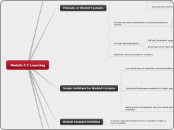Module 5 E-Learning
Benefits of Worked Examples
Help learners build procedural skills such as performing tasks
Helps learners develop strategic skills
Principles of Worked Examples
Support learning transfer
Near transfer - the ability to understand how to perform a task based on knowledge of a similar task.
far transfer - teaching strategies rather than tactics
Apply multimedia to examples
Illustrate worked examples with appropriate visuals
Present steps with audio only rather than audio and text
Present steps with integrated text
Present steps in meaningful groups
Give learners control of the pacing
Include instructional explanation of worked examples as needed
Conceptual understanding more important than problem solving
When there are no self-explanation questions
Mathematical content
Promote self-explanations
Add self-explanation questions to worked examples
Encourage active observations
Fade from worked examples to problems
Design Guidelines for Worked Examples
Use varied types of examples to provide additional context
Helps develop abstraction skills
Illustrate the same guidelines in different ways
Include self-explanation questions for better results
Promotes understanding by expecting students to explain the answer
Aids in abstraction skills
Helps internalize knowledge
Require active comparisons using the varied types of examples
Leads students in understanding similarities
Helps foster abstraction skills
Worked Examples Definition
A step-by-step demonstration of how to perform a task or solve a problem
Unknowns in Worked Examples
When to use fading rather than self-explananation questions
Both are effective alone
Used together they seem to cause cognitive stress
How to design and use modeling examples
Do modeling examples benefit from fading or other strategies
How does multi-media get worked into the example
How can active observation be used in workplace learning
How to Create Worked Examples
Use fully representative problems
Show each step in the process of solving the problem
Provide clear and concise descriptions of each step
